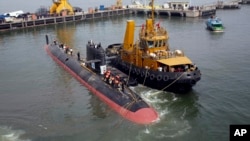A massive leak of secret data relating to the combat capabilities of submarines being built for the Indian navy by a French shipbuilder could delay their induction as India investigates the huge security breach.
More than 22,000 pages of information relating to Scorpene submarines were made public by The Australian newspaper.
India is not the only one affected by the confidentiality breach. The Scorpene, made by French firm, DCNS, is currently being used by Malaysia and Chile, and Brazil is also due to deploy the sub in 2018.
Defense Minister, Manohar Parrikar, said the leak did not originate from India and suggested that it could be the result of a hack.
The leaks have led to fears that the documents could be an intelligence gold mine for India’s rivals, China and Pakistan.
But Parrikar told the Indian media that “We have to first gauge the quantum of the leak and find out links to India.”
New Delhi signed the $3.5 billion deal for the submarines in 2005.
The first of the six submarines, which are being built at a dockyard in Mumbai, was scheduled to go into service by the end of the year, giving a much-needed boost to India’s depleted underwater capability.
But Abhijit Singh, head of maritime policy initiative at New Delhi’s Observer Research Foundation, points out that this could be pushed back as the navy will have to very carefully assess the leaked information to see how big a security concern it poses.
He said that a lot of information that has been revealed is sensitive. “For instance, the information on stealth, the frequencies, the noise that the propeller makes, depths to which the submarines can operate and all of that, which is really crucial data, which should not have been revealed.” he said.
However he and other naval analysts believe that while the leaks are damaging, it did not mean the huge defense project would have to be shelved.
Uday Bhaskar, a defense analyst and director of the Society for Policy Studies in New Delhi, said the jury is still out on how critical is the data that has been revealed. “It appears that the documents pertain to earlier generation of the Scorpene,” said Bhaskar.
Indian officials also downplayed concerns about the leak, saying several specifications had been altered since then.
The Australian newspaper described them as an “Edward Snowden-sized leak," referring to the classified papers the former government contractor disclosed from the U.S. National Security Agency.
The six submarines are crucial for the Indian navy.
“The Indian navy is in a very dire need of replenishment as far as its submarine fleet is concerned. The numbers are shrinking and the Indian navy has not been able to induct a fresh submarine for almost 15 years,” Bhaskar said.
A spokeswoman for the French firm DCNS described the leak as "a serious matter" and said French authorities would formally investigate.
The company is also building advanced submarines for Australia, but details of those were not part of the leak.

